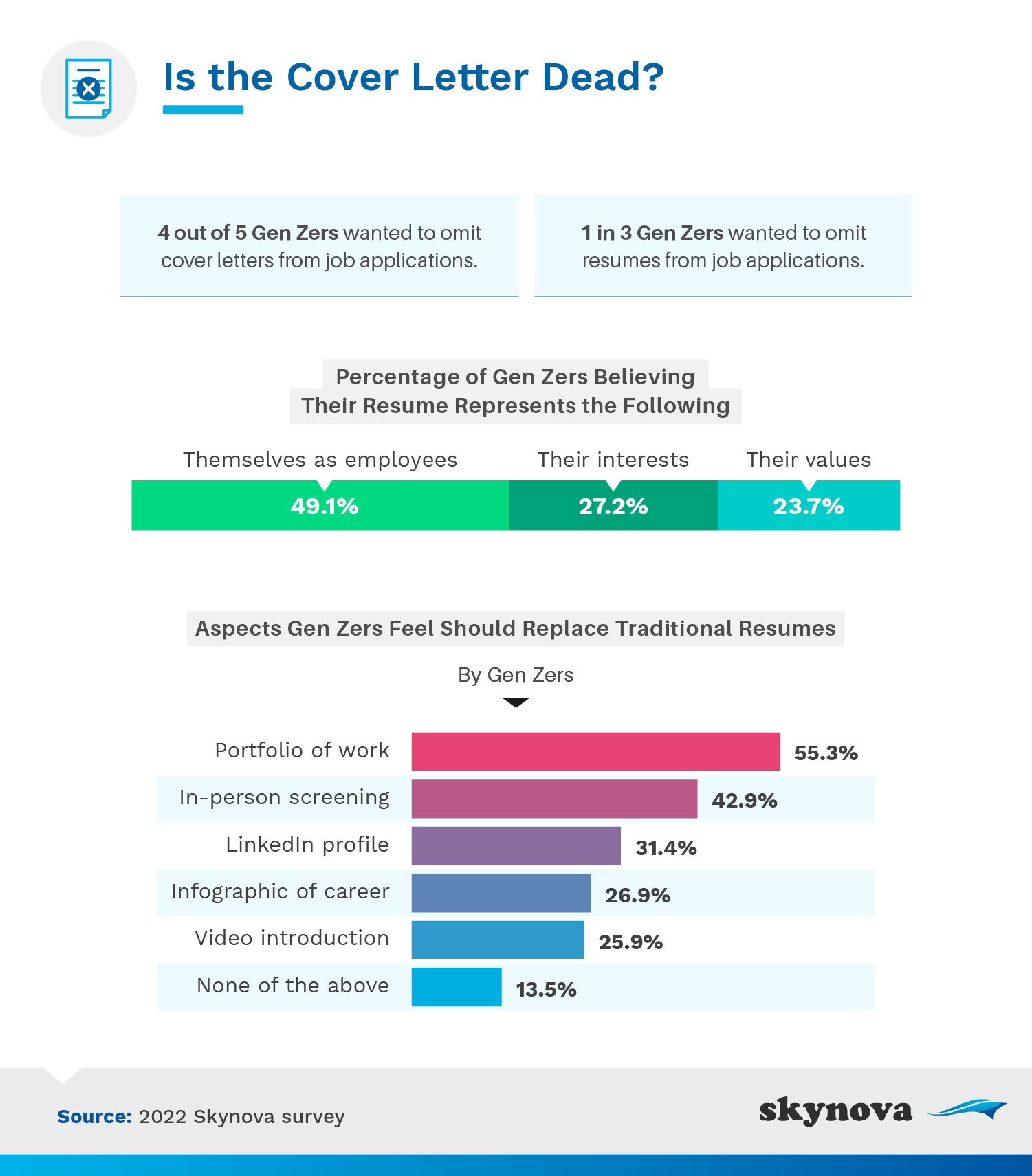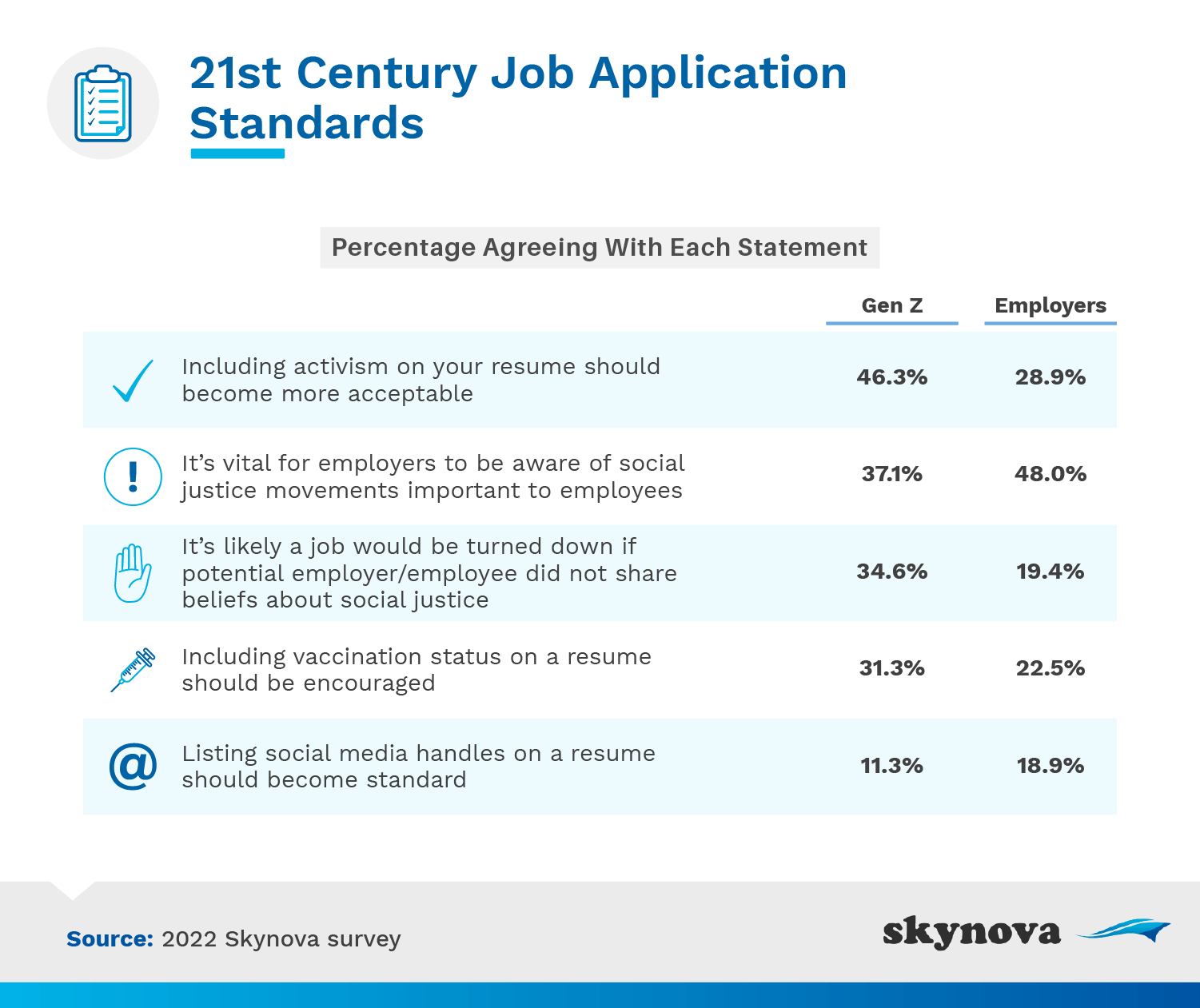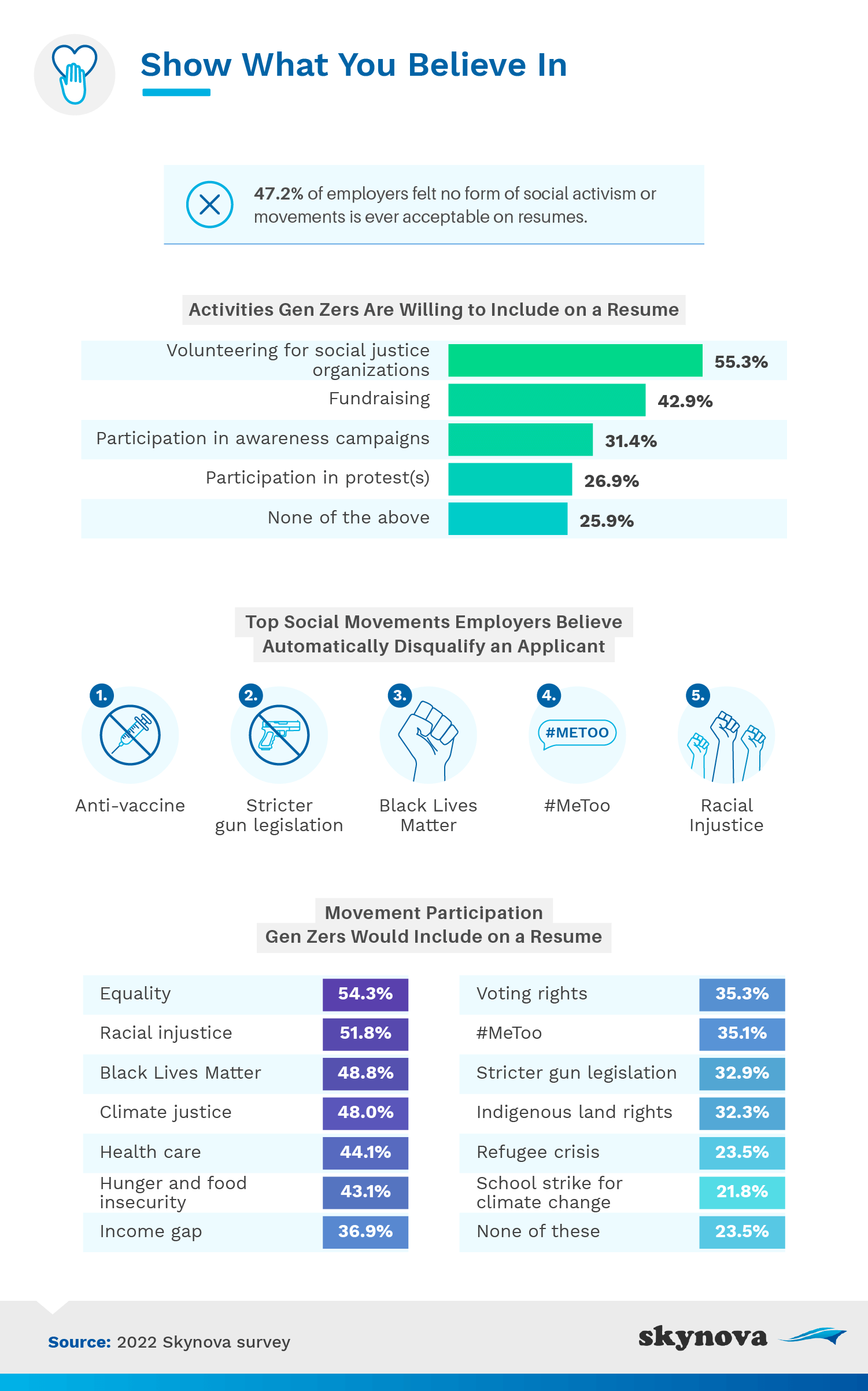
|
Activism has taken Gen Z by storm. Those born between 1997 and 2012 have been credited with revolutionizing the term "activist," as they continuously bring the fight for justice to the streets as well as the digital world. But should the fight be brought to their job applications as well? Many think yes; but employers often feel otherwise.
To uncover the differing opinions of Gen Z job applicants and their potential employers, Skynova conducted a countrywide study of both demographics. With 765 responses from both potential employees under the age of 25 and employers (averaging 46 years of age), the results show a clear dichotomy between the youths' enthusiasm and employers’ impressions.
Some companies don’t require cover letters. Some applicants have video skills they want to share. Some hiring managers are incredibly pressed for time. How is a modern job seeker supposed to know what to include or remove from their application? This first piece of our study asks Gen Z to share what they currently include and omit and what they feel their resumes represent overall.

When Gen Z wants to tell an employer about their activist roles, they’re not doing so in a cover letter. In fact, 4 out of 5 want to omit the cover letter altogether. Currently, many of the country’s most experienced hiring platforms, like Indeed and Monster, disagree as to whether cover letters are important. Still, Gen Z predominantly opting out may ironically make the cover letter more important than ever. It’s a way to stand out, show you care, and relay the seriousness of your candidacy.
The resume wasn’t necessarily the place for social justice information either–or perhaps any information, for that matter: 1 in 3 applicants wanted to exclude the resume part of the application process altogether. Instead, many were opting for work portfolios (55.3%), in-person screening (42.9%), or their LinkedIn profiles (31.4%). More than a quarter showcased their generation’s native digital skills and created a video introduction of themselves. Just a small 13.5% believed the traditional route to acceptance still worked best. While employers are still split on the effectiveness of video resumes, they are showing high success rates in the tech industry.
But what exactly were these (video) resumes trying to convey? Nearly a quarter felt the application accurately represented their values and belief systems. The remainder of the study digs into the specific nuances behind these value-based demonstrations.
How are Gen Z's actions being received by the people who make hiring decisions? This component of our research asks both Gen Z and employers to agree or disagree with statements related to specific resume approaches.

Gen Z was much more likely than their potential employers to believe activism should become more acceptable on a resume. While 46.3% of applicants under the age of 25 agreed as much, 71% of employers disagreed completely.
Employers were much more tolerant of differences - they were unlikely to turn down an applicant because they failed to share the same beliefs about political justice. However, it was not unheard of: exactly 19.4% of hiring managers admitted they would turn down an applicant who did not echo their beliefs.
With activism (or a lack thereof) clearly creating some divides between some potential employees and employers, we decided to dig a little deeper in the final piece of this study. Here, we look at the specific activism-related topics Gen Z wants to put on their resumes as well as how employers receive the concept overall.

If it was acceptable, Gen Z would be happy to show their interests and concerns on their resumes. The majority mentioned explicit interest in highlighting both equality and racial justice on the job application itself. Movements like Black Lives Matter and climate justice will likely make their way into the resumes of nearly half of Gen Z’s applications.
Unfortunately, Gen Z’s best intentions may not be well-received by many employers and could ultimately disqualify them from some positions. Forty-seven percent of employers in this study said that activism-related topics are never considered acceptable on a resume. And the topics of most interest to Gen Z, like Black Lives Matter or activism for stricter gun legislation, were some of the most likely to automatically disqualify a candidate.
Employers and their youngest applicants are certainly at odds on this topic. While the majority of Gen Z demonstrated interest in including their activism-related experience on a job application, many employers felt it was neither the time nor the place to do so. Many went so far as to say specific activist issues would automatically disqualify a candidate. It is clear that Gen Zers are looking to change the established ways in which one applies to a new job; they are looking to abolish cover letters, and looking for new ways to show their values and beliefs when introducing themselves to a new employer.
While activism may well change the impressions future employers receive upon reading, it is important to note the specific reasons for resumes. Employers are pressed for time and are therefore interested primarily in what makes a candidate a fit for a specific role. If organizational experience or leadership roles are relevant to the position, then perhaps the resume is a good place for activism. If not, consideration of the application’s purpose may make someone more likely to land the job.
Skynova is dedicated to helping the small-business owner thrive through providing online software like invoices, accounting, time sheets, and more. Skynova also researches the latest in small-business news and freely provides in-depth articles about various topics their customers find interesting. From research such as this to financial advice and everything in between, Skynova is ready to help business owners focus on their inherent value and contributions to their communities.
This study uses data from a survey of 512 Gen Z employees and 253 employers located in the U.S. Survey respondents were presented with a series of questions, including attention-check and disqualification questions.
Much of your audience is likely applying to new jobs during this Great Resignation. You can help them achieve their goals by simply sharing the findings of this research. We simply ask that you do so for noncommercial purposes and to include a link back to this page in your story so readers have access to our full findings and methodology.